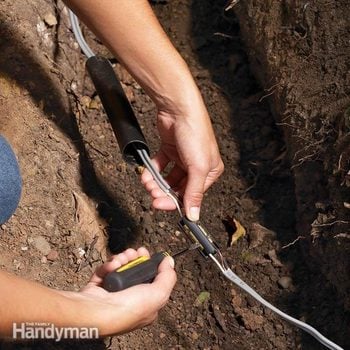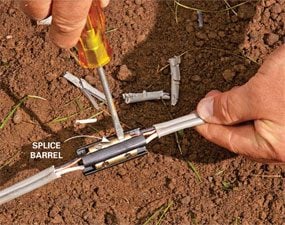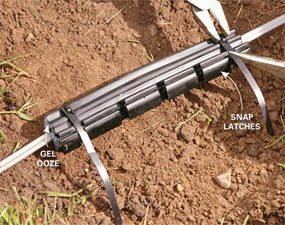Water Well Wire Accidentally Cut It Can You Patch It Back Together
Fix Underground Wiring
Make a splice that will last longer than the wire
 Family Handyman
Family Handyman
Accidentally cut an underground electrical wire? The easiest way to repair it is with an underground splice kit, which uses a rustproof connector to repair and seal the break.
You might also like: TBD
Assess the damage
If you're digging holes in your backyard, you should always call 811 a few days beforehand to mark all the underground utilities. Unfortunately, privately owned wiring will not be marked, so it's still possible to strike an electrical cable. It's especially likely if you're digging between the house and a freestanding garage, shed or yard light. If you do cut a power line, though, it's easy to fix. Here's how.
First turn off power to the electrical device fed by the broken cable at the circuit panel. Then dig 12 in. on each side of the break in the wire and gingerly work your way to the cable. You'll find the cable anywhere between 12 and 24 in. deep. When you locate the cable, use a noncontact voltage detector to ensure there's no power.
If you have a broken underground line and no clue where the break is, hire an electrician with an underground open/short locator. The electrician will be able to locate and mark the underground cable, determine how deep the cable is buried and pinpoint within a few inches where the problem exists.
Two Splice Kits
Underground AC splice kits come in two varieties: heat-shrinkable tubing and gel-filled shield. Both use a brass splicing block to connect the wires. But they differ in how they protect the splice.
The most common type of kit protects the splice with an 8-in. length of heat-shrinkable tubing filled with watertight hot-melt adhesive. (The Gardner Bender HST-1300, available through our affiliation with Amazon.com, is shown here). Slide the tubing over the cable before you connect the wires to the splice block. Then slide the tubing over the connector and shrink it with a heat gun (best) or a torch (gently!). The other type is a corrugated plastic shield filled with an encapsulating gel. (The Tyco Electronics PowerGel WrapAround UF Splice Kit, also available through Amazon.com, is one brand). It's twice the price, but it installs much faster, is goof-proof and is very long lasting.
Heat-shrinkable tubing repair

Underground connector
Use a splice block to fix a severed cable.

Photo 1: Join the wires
Insert the wires into the splice block connectors, making sure the colors match up, then tighten the screws.

Photo 2: Seal the connection
Slide the heat-shrink tube over the connector. Use a heat gun to shrink it and seal the connection.
Replace the whole section of cable that you dug up with the same gauge UF (underground feeder) cable. Cut the cable about 12 in. on either side of the break. Then strip back the sheathing 2 in. and the wire insulation 5/8 in. Use two special underground splice kits (sold at home centers) to connect the new cable section. Slide the heat shrink tube over one end of the cable, then connect the wires to the brass connector (Photo 1). Do this on both ends of the new cable. Once the damaged cable is replaced and the wires are joined with connectors, slide the heat-shrink tube over each connector (Photo 2). Heat the tube with a heat gun until it shrinks tight on the connector and sealant bubbles out the end.
Gel-filled splice kit repair

Photo 1: Twist and pull to separate
Grab each of the side conductors with pliers. Then twist your hands in opposite directions to start the tear. Pull the conductors 180 degrees away from each other to separate and expose a length of 1-1/2 in. Strip 3/4 in. of insulation off the black and white wires.

Photo 2: Match the colors and splice
Slide the black wires into opposite ends of the brass barrel and tighten the screws. Then do the same for the white and bare copper wires.

Photo 3: Position the splice on the shield
Place the splice block dead-center over the gel-filled shield. Clean off any debris that may have fallen into the gel. Then press the splice into the gel.

Photo 4: Roll and snap
Roll the shield around the splice and align the plastic latches. Snap the latches, starting at the center and working toward the edges. Then install the zip ties and tighten with pliers.

Photo 5: Mark the location
Tie bright-colored surveyor's tape around the splice and fill the hole with soil. Replace the grass and trim the tape at soil level so you can find it again.
Start by cutting out the damaged sections. Then cut, separate and strip the ends of the buried cable (Photo 1). Do the same for the additional section of cable (if needed). Next, secure the wires in the brass holder (Photo 2). Locate the splice block in the protective shield (Photo 3). Wrap the shield around the splice and secure it (Photo 4). Then repower the circuit to make sure the splice works.
To make it easier to locate the splice in the future, mark it with bright-colored surveyor's tape (Photo 5). Then refill the hole.
Splicing Low-Voltage Cable
Besides underground power cable, it's also possible to slice through low-voltage lighting, irrigation and telephone cable and coaxial cable. Since they're low voltage, you may be tempted to just twist the wires and wrap the splice with electrical tape. It won't work. Instead, head to a home center and get a couple of low-voltage connectors for direct burial. They rely on gel to encapsulate the splice to prevent water intrusion and corrosion.
For low-voltage stranded cable, like you might find on lighting, use the wire nut/gel-filled tube style. Twist on the wire nut, plunge the connector into the tube until the gel oozes out the top, then snap the lid. For solid irrigation and telephone wire, shove the wires in an insulation piercing gel-filled connector and snap it closed.
Required Tools for this Project
Have the necessary tools for this DIY project lined up before you start—you'll save time and frustration.
You'll also need a heat gun for the heat-shrinkable tubing.
Required Materials for this Project
Avoid last-minute shopping trips by having all your materials ready ahead of time. Here's a list.
Similar Projects
Water Well Wire Accidentally Cut It Can You Patch It Back Together
Source: https://www.familyhandyman.com/project/fix-underground-wiring/
Post a Comment for "Water Well Wire Accidentally Cut It Can You Patch It Back Together"